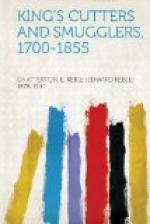Hanning was followed by a certain Captain Joseph Cockburn, who had a very instructive story to tell, which must have amazed even the Commissioners. This gallant skipper was now commanding one of his Majesty’s sloops, but prior to that he had been engaged in privateering, and before that had commanded several vessels employed in smuggling. From his very infancy he had been concerned in the practice of running goods, and his apprenticeship had been served to a smuggler at Rochester, who was nominally a fisherman. Consequently, with an accumulated knowledge obtained first as a smuggler and subsequently as a pursuer of smugglers, there was not much, if anything at all, in connection with the work which could have missed his attention. He proved himself a veritable encyclopaedia of smuggling information, and even the following brief summary will show that his experience was something exceptional.
First of all, he instanced the case of five cutters which he knew were constantly employed in running tea and brandy from Boulogne into Kent and Sussex. They imported at least six tons of tea and two thousand half-ankers of brandy every week. He estimated that the six tons of tea would be purchased abroad for L1920. The two thousand half-ankers of brandy, even if they cost but ten shillings apiece, would represent the sum of L1000; so altogether there was a total of nearly L3000 being carried out of the country in specie every week by these five cutters alone. But he also knew of five other cutters which were constantly employed in fetching brandy and tea from Middleburgh and Flushing, and he reckoned that these ten cutters in the aggregate smuggled into the United Kingdom each year goods to the value of L303,680. Possibly there was no living person who possessed so perfect and exact a knowledge of the smuggling trade, so we can have little reason to doubt for a moment the veracity of his figures.
Passing, then, to describe the methods employed by these men, he divided them into two classes. Firstly, there were those adopted by the cutters and smacks which did little else than smuggle, and, secondly, there were the British ships which primarily carried on a legitimate trade to foreign parts. As to the first class, the practice of these cutters and smacks was to put to sea from whatever port to which they belonged—London, Dover, Rye, Folkestone, or wherever it might be—having on board a small number of hands, their professed object being to fish. Having stood some distance away from the land, they would be met during the night by a number of smaller craft, and under cover of darkness would take on board from the latter large crews, much merchandise, and a considerable amount of money. The smaller craft rowed or sailed back to the beach before daylight, and the bigger craft, now well supplied with men, money, and merchandise, stood on their course for some Dutch or French port. There they purchased such goods as they required, disposed of those which




